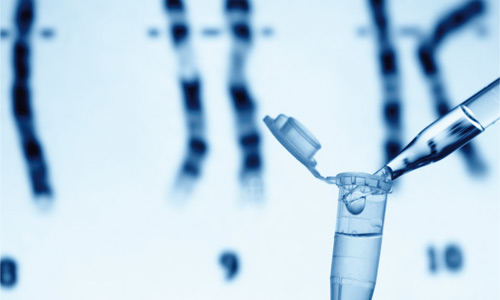A test to determine your risk of developing cancer
Although most cancers are sporadic in origin, between 5 and 10% are considered hereditary, but 25% have familial aggregation, and some of these families could also have low-penetrance genetic alterations or risk combinations. Dexeus Mujer offers a Cancer Risk Test (qCancer Risk of qGenomics) so that you can find out your inherited genetic predisposition to cancer.

The test
With the new Cancer Risk Test it is now possible to identify up to 200 genetic mutations associated with a high risk of suffering from this disease.
The test is conducted on a blood sample (or saliva sample if it is not possible to draw blood), from which we obtain DNA to simultaneously analyse a large number of genes and detect the presence of mutations.
Depending on the results, the case will be referred to our Cancer Risk Unit to establish the most appropriate preventive strategy for the patient in question.
A study can also be carried out to determine which family members could have a genetic alteration in order to give you guidance on how to prevent the risk of disease in the rest of your family.

Who is it for
Although this test is aimed at anyone who wants to know their predisposition to cancer, it is recommended in the following cases:
CANCER RISK TEST
- You have three or more first-degree relatives (parents, children and siblings) or second-degree relatives (grandparents and uncles) diagnosed with cancer in the same organ.
- You have two or more first- or second-degree relatives diagnosed with cancer at a younger age than usual. For example, breast cancer before age 40, colon cancer before age 50 or prostate cancer before age 60.
- The cancer has bilaterally affected two of your relative's organs. For example, both breasts or both kidneys.
- You have a known family history of a related syndrome with a hereditary predisposition to cancer.
- You have a relative diagnosed with cancer in two different organs.
In these cases, we recommend you contact our Cancer Risk Unit to evaluate your family history and identify whether there is an inherited genetic predisposition in your family. To do this, you will need to provide as much information as possible on the cases of cancer in your family:
- Type of cancer that you and/or members of your family have had.
- Age of onset of each cancer.
- In the event of the death of a family member, cause and age of death.
Why choose us
With 50 years of experience treating more than 30,000 patients, we have been endorsed as a leader in the fight against women's cancer.
Since the creation of our first Gynaecology, Oncology and Mastology committee in 1974, made up of specialists in gynaecology, oncology, radiology, pathological anatomy, radiotherapy and aesthetic surgery, we have worked with the goal of evaluating each patient's issue individually in order to establish a personalised and tailor-made treatment.
Our committee studies more than 1,200 cases a year, which are treated in one of Europe's largest private centres devoted exclusively to women.
We have the most advanced technology for the diagnosis and treatment of cancer, with state-of-the-art ultrasound machines and very low radiation mammography equipment which allows us to offer our patients reliable diagnoses from a very young age and without radiation risks, as well as laser and endoscopy equipment for the treatment of pre-invasive lesions.
In addition, our Clinical Genetics Unit can determine if you have a genetic risk of developing breast cancer. If so, we provide clinical monitoring even before it is diagnosed.
We have a dedicated cancer care service.



